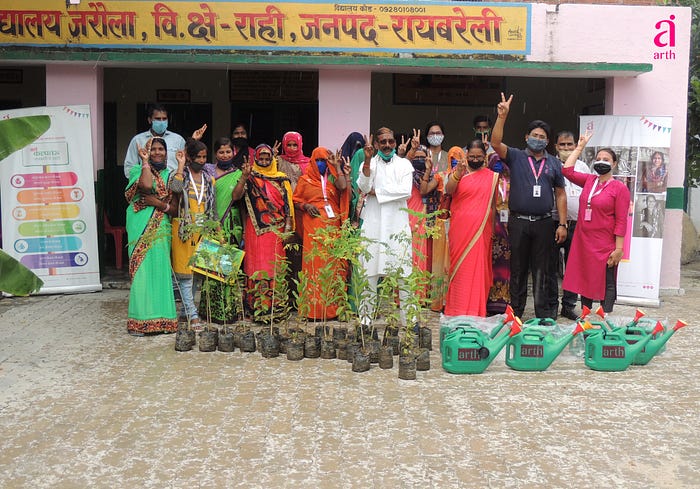ARTH Poshan Vatika: Nutritional kitchen garden for the undernourished families

Ghar ka aangan — Ghar ki Sabziyan
ARTH Foundation launched its latest initiative - ARTH SWASTH POSHAN VATIKA for families affected by lower nutritional levels in the rural areas of Raeberali, Uttar Pradesh. Thousands of households in India do not receive sufficient amount of nutrition in their routine diets or do not have sufficient amount of food to eat due to low income. Due to this lack of proper nutritional intake, children are either too thin or too short for their age, resulting in anomalies like stunting or wasting.
According to the Global Nutrition Report 2020, the highest within-country inequality in malnutrition rates were found in India, Nigeria, and Indonesia; with four-fold variations across communities in our country. Within India, over the years Uttar Pradesh has recorded the lowest levels of nutrition and the highest cases of malnutrition in women and children.
IDENTIFYING MALNOURISHED WOMEN AND CHILDREN IN THE REGION

In August 2020, ARTH Foundation conducted a survey in Raeberali, Uttar Pradesh to assess the health profiles of families in rural areas. From the survey, 8 out of 11 families consumed vegetables occasionally in their diet depending on the availability and affordability of resources. These families have an average total income of INR 3400 monthly, with the lowest being INR 1000 and the highest of INR 5000 per month respectively. Only 3 families said to consume one dairy product (curd, buttermilk, milk, etc) daily and 8 out of 11 families consumed no dairy at all. 3 out of 11 families confirmed that they had malnourished children and pregnant women during the survey.
Hence, from the above highlights, it can be concluded that the majority of the people belonging to lower-income households are unable to afford a basic balanced diet with dairy, vegetables, lentils, etc., and are sustaining on either a half-filled or an empty stomach most of the time.
SWASTH POSHAN VATIKA: PROMOTING ORGANIC AND SUSTAINABLE PLANTATION

With a vision to enable access to nutritious fruits and vegetables amongst the underserved people, ARTH identified the affected families and built a kitchen garden on the available land. As an approach, it was ensured that the end-to-end design of the program was well structured to produce the desired quality of results, with a focus on re-using domestic wastewater and produce.
Survey: To identify families affected by malnutrition. The survey included details of family members, diet plan, nutritional intake, income, expenses, etc.
Design: Measurement and plan of the available free land within the ownership of families. A layout to accommodate a maximum number of plants was created in the identified land, along with a fence to protect saplings from the attack of wild animals.
Training: To make the families aware of the importance and impact of nutritional deficits in the human body. The training also helped the customers in understanding sustainable methods to grow organic fruits and vegetables in their own households; and ways to maintain the plantation.
Vatika Kit: A custom-made kit carrying fertilizers, fortified seeds, a watering unit, vegetable calendar, saplings, etc. was distributed to build the garden. Hybrid seeds of leafy vegetables, climbers, root vegetables, herbs & shrubs, fruits, etc., induced with additional minerals and vitamins to add to the nutritional levels of the consumers, have a faster germination time, and produce fruits with higher nutrition content. Seeds included: Drumsticks, beetroot, spinach, potatoes, carrots, guava, garlic, pumpkin, radish, capsicum, etc.
Monitoring: To ensure that the planted seeds and saplings grow healthily without being attacked by insects or pests, the ARTH Foundation team visits the garden weekly and records the growth progress for measuring progress and impact.
UPGRADING HEALTH AND NUTRITION

The key focus for Poshan Vatika is based on making households stronger and well-equipped with nutritional home-grown products while re-using all the available resources. With a healthier palate, we intend to enhance the well-being of underserved families. For example, if a child is eating up to his appetite, he will be able to put his concentration on his studies instead of getting distracted by any illness or any other efforts that he may have to put to hunt for food or resources.
After carefully studying the individual profiles of women and their families, ARTH Poshan Vatika’s have been created within the available resources to fill in the nutrition gaps. Not only will this help in reducing the health concerns of the existing generation, but it will also lower the effect of malnutrition and any other decencies in future generations.
Aao sab milkar vatika banaye. Swasth parivar, swasth Bharat banaye.








